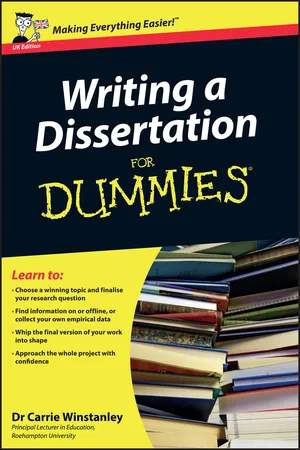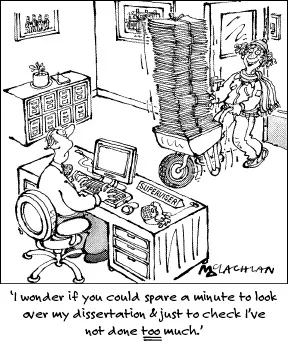Part I
Understanding What a Dissertation Is
In this part...
In this part I explain what a dissertation is, how much work it involves, and on what sort of course you can expect to be asked to write one. I also give you the tools to produce a workable and rewarding research question – the question which underpins your dissertation – including how to choose an area which maintains your interest.
Chapter 1
Sorting Out the Basics of a Dissertation
In This Chapter
Finding out what a dissertation is
Discovering the different types of dissertation
Sounding out some of the main social science subjects
Chances are you’ve picked up this book because you’re embarking on a dissertation, or similar final-year project. This implies that you’ve successfully completed previous essays and exams and probably even presentations and portfolios as well. So, you’re already a successful student and this book will help you build on your strengths whilst identifying ways to improve how you study.
If you’re still quite far off from getting to your final year, thinking about it now is a great start - thorough preparation is going to help you succeed.
A dissertation is just an important sounding name for a long essay – based on your own research. Writing a dissertation is an exciting, challenging, rewarding and often wonderful experience. At the same time it can be exhausting, time-consuming, frustrating and exasperating.
Take heart! In this book I set out to tell you the ins and outs of writing a dissertation and give you all the help you need to make sure your dissertation is a success.
What Is Social Science, Exactly?
Broadly, the social sciences look at the state of society and the people that make up societies. By now you’re sure to have discovered that the social sciences cover an enormously wide range of subjects. Deciding what counts as social science is an ongoing area for debate – a topic that’s great for a dissertation in itself!. For clarity in this book I’m going to rely on the Economic and Social Research Council (ESRC) definition of social sciences. The ESRC is the main government funding council for research in social science in England and Wales and so their ideas have currency. In the section ‘Pinpointing your field of study’ later in the chapter you can find a description of each of the areas the ESRC considers makes up the social sciences.
Here’s a mini A–Z rundown of the main social science disciplines; a refresher course that’s hopefully going to get your dissertation juices flowing. If the subject you’re studying is related to any of the disciplines in the list, with luck the book is going to be spot-on for your dissertation. Throughout this book I use examples from the more commonly studied social science subjects, such as education and sociology, but the ideas apply equally to other sub-disciplines of the social sciences like sociolinguistics, journalism, international relations, criminology and gender studies. These fields usually fall under a broader discipline, so gender studies form part of sociology while international relations constitute part of political science.
Anthropology
Anthropology is the scientific study of human beings and their way of life. The word anthropology comes from the Greek ‘anthropos’, meaning a ‘human being’ or ‘person’. The main research method in the science of anthropology is ethnography, which involves collecting raw data through field work and reviewing the data to get the whole picture of the society being studied and linking the data to other areas such as archaeology, biology, linguistics and the humanities.
Economics
The science of economics analyses and describes how wealth is produced, distributed and consumed. Economists use current thinking backed up by data to find ways of balancing people’s economic needs with the way the needs are going to be financed . The word economics comes from the Greek words ‘oikos’, meaning ‘family’ or ‘household’ and ‘nomos’ meaning ‘custom’ or ‘law’. Generally, economics is split into two branches: the study of individual households, companies, industries, and commodities (microeconomics) and the study of economics on a large scale such as national income and international trade (macroeconomics).
Over the last 20 years, the methods and reasoning underpinning economics are being applied to other social issues. For example, the economic principles of cause and effect, which tries to explain how the economy is affecting people’s behaviour in areas such as businesses, families and relationships. Economics also takes in green economics, Marxist ideas, socialism, globalisation, institutional economics and economic sociology. Despite the many different areas that economics embraces, the science is above all concerned with getting value for money by way of human effort, or ‘labour’.
Education
Education (also called pedagogy) is the science of teaching and learning. Educational science covers both theoretical and applied research and draws on a multitude of disciplines as well as taking into account other factors affecting learning: emotiona...




